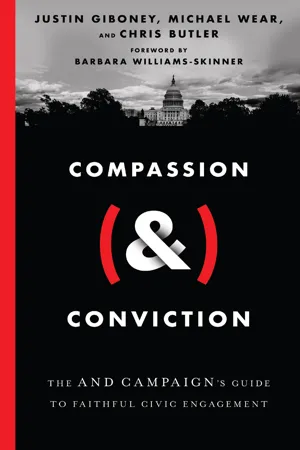In 1830, the Indian Removal Act led to what’s known as the Trail of Tears, in which almost fifty thousand indigenous people were removed from the southeastern United States and relocated west of the Mississippi River. More than four thousand persons died from disease, hunger, and cold during the journey. This forced relocation was popular with Americans who were eligible to vote because it freed up land for settlers, but it led America further down the path toward the heinous sin of exploitation and oppression of indigenous people.1
According to Robert L. Burgdorf Jr., who contracted polio as a toddler, people with disabilities faced “widespread, systemic, inhumane discrimination” prior to organizing and advocating alongside their allies against such societal barriers. Children with disabilities were systematically excluded from public schools; public transportation was almost totally inaccessible to those with mobility and visual impairments; and many were institutionalized in remote, unsanitary, and dangerously overcrowded facilities. Some people with mental and physical conditions faced involuntary sterilization and were denied lifesaving medication and medical treatment. All these things motivated Burgdorf to write the Americans with Disabilities Acts of 1990.2 This landmark legislation prohibited discrimination against people with disabilities in employment, public services, public accommodations, and telecommunication.3
Both instances represent political decisions that changed the course of history. In one instance, Americans failed to stand up for the voiceless and vulnerable. In the latter example, America finally corrected a history of injustice and neglect. In both cases, citizens had an opportunity to significantly affect the present and future well-being of others. Had Christians organized and rallied against the Indian Removal Act, perhaps they could’ve stopped President Andrew Jackson from signing it, saved thousands of lives, and even improved the station of indigenous people today. We’ll never know for sure, but we do know that our participation in the political process or lack thereof—and the principles we employ—greatly affect our neighbors.
Politics can be a matter of freedom or imprisonment, free speech or censorship, housing or homelessness, life or death. Politics is an essential aspect of modern life. It is how we govern ourselves, and it plays a major role in how we organize ourselves as a society. Political actions have started wars and defined certain people as property, but they’ve also fed the hungry and provided care for the sick. Christians must be faithful and thoughtful in how we choose to wield our influence and political power.
We hear endlessly about political scandals, broken campaign promises, deceptions, and power trips. Watch local news and it immediately becomes clear that politics can be corrupt, dangerous, and filled with idols. Some people get involved in politics for the wrong reasons, and others who start with lofty ideals seem to lose their original purpose in the fray. Given this reality, should Christians participate in politics? Should we partake in such a broken arena or leave the political world to its own devices?
Politics is ugly and imperfect because our world is broken—because we as individuals are broken. Nothing was unaffected by the fall (Genesis 3), and politics is no exception. But like it or not, politics touches every aspect of society. How and when we worship, what constitutes a crime, and what children learn in school are all subject to political decisions. To avoid or dismiss political engagement is to forgo an important opportunity to help our neighbors and to promote the righteousness and justice that are the foundation of God’s throne (Psalm 89:14).
We hear a lot of disheartening stories about politics and politicians, but there are also many encouraging stories—stories in which the needy are supported and society is improved because of kindhearted advocacy and thoughtful policy decisions. Refusing to engage civically is failing to steward the things God has placed in our sphere of influence. How can we be salt and light if we have no contact with society (Matthew 5:13-16)— especially in an arena with such a significant and broad impact on society? Christians should engage politics because doing so provides us with a robust opportunity to love our neighbor by acting justly, promoting human flourishing, and seeking the prosperity of our community.
The Christian’s Primary Objective
As Christians, our primary objective is to profess the gospel of Jesus Christ to all nations (Matthew 28:16-20). No other task should be allowed to interfere with or obscure that purpose. If the Great Commission becomes secondary, or if Christianity is understood primarily as a means of accomplishing social or political goals, then we’ve handed to Caesar what belongs to God (Matthew 22:21).
Do not interpret this book’s focus on the political space as a suggestion that professing the gospel should be subordinated to political activity. While God has given us power to bring about change and help those around us in real ways (James 2:15-16), our world will continue to be a place of sin and suffering until Jesus returns (Romans 8:19-21). This truth is important to keep in mind as we discuss our interactions with society. It provides us with perspective, helping us remember the ultimate things rather than being consumed by the temporal matters of this world. Our civic participation will not glorify God if it’s placed above worship, evangelism, or Christian fellowship.
Why Should Christians Engage Politics?
What are you willing to do for the people you love? If a family member was being mistreated, in addition to your prayers would you also use your time and resources to stop them from being hurt? If they were unjustly imprisoned, would you advocate for them? If a teacher was treating your child unfairly, would you address the issue? Of course you would. We rightly expect that kind of urgent action from the people who say they care about us.
In the Great Commandment, Jesus says to “love the Lord your God with all your heart and with all your soul and with all your mind” and to “love your neighbor as yourself” (Matthew 22:37-39). When Jesus is asked “Who is my neighbor?” by a lawyer who’s trying to narrow this love imperative, Jesus responds with the Good Samaritan parable. Through that illustration we learn that our neighbors aren’t just allies or people in our community. Anyone can be our neighbor, and we are called to be a neighbor to everyone we have the capacity and occasion to help (Luke 10:25-37). To love others as we love ourselves is to give them the care and consideration that we’d provide for ourselves and our loved ones. If we were negatively impacted by injustice, we would advocate for ourselves; according to Scripture, we should also advocate and stand up for others (Isaiah 1:17).
Part of taking the Great Commandment seriously is realizing that love is more than a feeling or sentiment. Love is substantive and active. Loving our neighbors is not the same as simply not hating them; in the biblical sense love is not a lack of hate or of anything else. Love has form and content, as described in Scripture, and it compels us to act (1 Corinthians 13; see also Matthew 5:43-47). If you never left your home and avoided all interaction with other people, you couldn’t be characterized as a loving person. Instead, you might even be unloving because of your lack of concern for others.
Loving our neighbors involves actively seeking their well-being. James 2:15-17 illustrates this point well:
Suppose a brother or a sister is without clothes and daily food. If one of you says to them, “Go in peace; keep warm and well fed,” but does nothing about their physical needs, what good is it? In the same way, faith by itself, if it is not accompanied by action, is dead.
Saying that we love our neighbors is nonsense if it’s not reflected in our actions. Such actions are the outworking of our faith. If we’re unwilling to go out of our way and use our resources to make sure others are taken care of, we’re not living like the good Samaritan—or, more importantly, like Jesus Christ.
The Great Requirement and Doing Justice
In Micah 6:8, we find what has been called the Great Requirement:
He has shown you, O mortal, what is good.
And what does the LORD require of you?
To act justly and to love mercy
and to walk humbly with your God.
Just as the Great Commandment requires us to actively love our neighbors, the Great Requirement commands us to further the cause of justice.
The first part of this requirement, “act justly,” obligates believers to take affirmative steps toward promoting justice. Like love, justice is more than merely the lack of injustice. Justice is substantive and active; it means we’re willing to give of ourselves for others. The political arena enables Christians to act justly in meaningful ways.
The prophet Isaiah describes God as a purveyor of righteousness and justice continually, and speaks to God’s expectation that his children will bring about righteousness and justice as well (Isaiah 59:14-17). Justice is a clear and prominent theme in the Old and New Testaments. Also, in both the Old and New Testament, Scripture tells us that government is ordained by God. Paul writes in Romans, “Let everyone be subject to the governing authorities, for there is no authority except that which God has established. The authorities that exist have been established by God” (Romans 13:1). Government is for our good (Romans 13:4), and there is a biblical expectation that governmental bodies ought to uphold and advance justice (Amos 5:15). The Psalms contain a prayer that governmental leaders of that time might “defend the afflicted among the people, save the children of the needy,” and “crush the oppressor” (Psalm 72:4).
In other words, our government is tasked by God with protecting us and rendering justice. Moreover, while there is no biblical prescription for precisely which system of government (monarchy, liberal democracy, etc.) is best, we can trust that God has placed us in a particular time, place, and context in which political decisions regularly affect our neighbors for good and for ill. Therefore, Christians should participate in the political system and do our best to ensure that society is treating people fairly and upholding healthy standards of human dignity. In Jeremiah 29:7, God calls the believer to “seek the peace and prosperity of the city to which I have carried you into exile. Pray to the LORD for it, because if it prospers, you too will prosper.” We’re not islands unto ourselves; we’re affected by what goes on around us and should pray and take action out of concern for it.
Whether we’re protecting the unborn, supporting fair prison sentences, or making sure the elderly are taken care of, politics provides a forum for advocating for our neighbor’s well-being and pursuing justice. Our daily walk should be a promotion of the love and truth of the gospel (Ephesians 4:15). Treating all God’s children with human dignity through the political arena is an opportunity we should not bypass.
Politics provides Christians with an opportunity to actively love our neighbors through advocacy, policymaking, and civic representation. To refuse to engage in politics is to refuse to take advantage of a useful tool for God’s work.
BIBLICAL EXAMPLES
Christians aren’t limited to analyzing our relationship with the public square solely in theory or through abstract application. The Bible itself provides us with several concrete examples of righteous people who used politics to further the will of God and help their nei...


